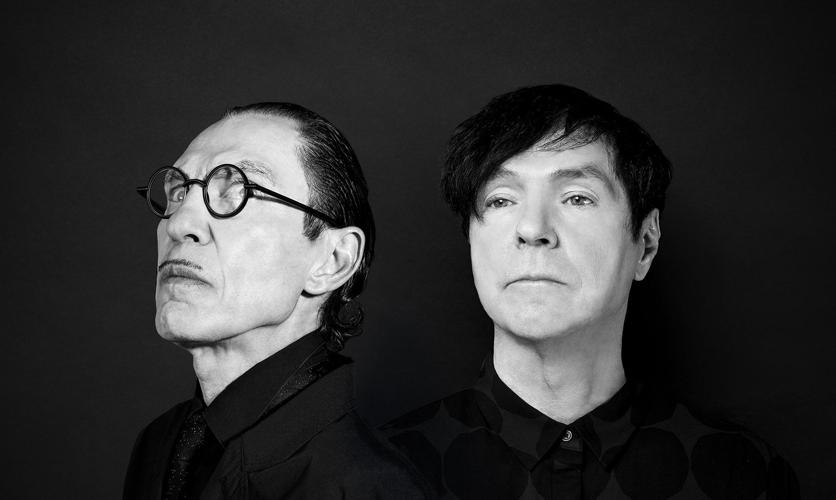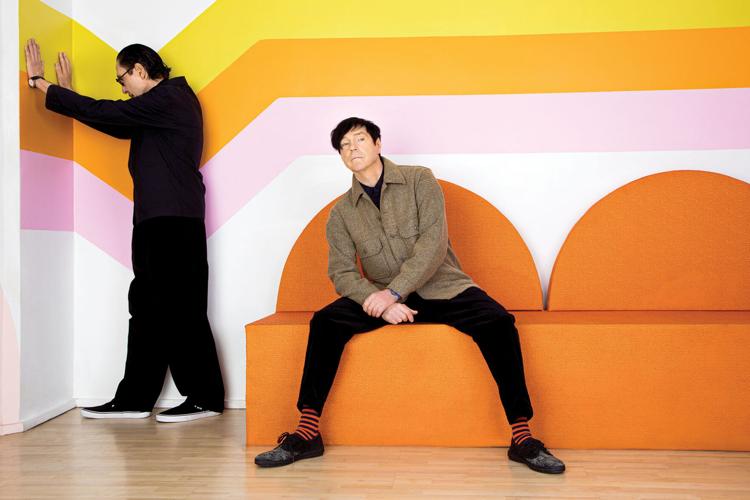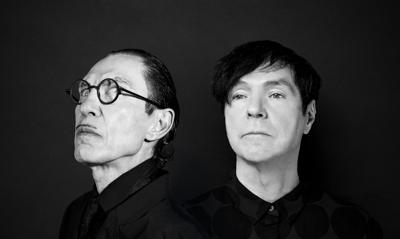Some kind of grand cosmic alignment made 2021 the year that Sparks — after 50 years as a band and 25 albums of deft, mordantly smart music that spans genres and moods with an ease that most artists in any medium struggle with — became media sensations. Two major films (the documentary The Sparks Brothers from Edgar Wright and the avant-musical Annette with Leos Carax) kept bringing fuel to the fire. All of a sudden the Mael brothers, Ron and Russell, weren’t just a cult band venerated by a select few hardcore fans. And the world has thankfully taken notice: Sparks have embarked on their biggest North American tour yet.
Because the universe is sometimes beneficent, I spoke with the Maels in the fall ahead of The Sparks Brothers’ release on Blu-ray and Annette coming to streaming services. The part of our conversation previously published online focuses on those films, but we also discussed Sparks’ wide-ranging musical career in more depth. Read on, ahead of two stops in Tennessee: at the Ryman on March 22, and at Knoxville’s Tennessee Theatre during the Big Ears Festival on March 24.
Ron, in a great 2017 interview with Diffuser, you discussed how you and Roxy Music ended up in a sustained competition in the ’70s. What is it like to still be recording after all this time, when all your rivals have pretty much fallen by the wayside?
Ron Mael: It was a really healthy kind of rivalry. We were on the same label at the time, and there were always certain stylistic similarities between us. We never needed that — we’re very motivated pretty much all the time, but somebody doing something really well while working in your general territory will definitely make you try a little harder. We don’t really feel that so much now. And part of that is we don’t really feel that kind of competition or inspiration from another band that’s been around as long as we have. … They tend to take a turn and become more mellow and reflective in a sense. And I’m not criticizing that. We’re just always hyped-up and caffeinated. It’s hard to find a band now to feel pushed by.
Is it possible that this inescapable fact of modern rock is what led to the resurgence of ABBA?
[Ron laughs.]
How does it feel to be playing Nashville for the first time?
Russell Mael: We’re excited. What’s happened with all of the attention from the two movies and the last couple of albums, there have been these opportunities to come to parts of America that we’ve never been to before in our entire career. And also to do it on a bigger scale as well, playing at the Ryman. In the past, we might not have been able to play here in that kind of historic venue. We’ve found that wherever we do go, now there’s a core group of people who know the band and have been waiting a long time for us to come and play. And America’s been more neglected than anywhere else in the world, for Sparks, excepting the coasts. For us to come south is really exciting, and we’re looking forward to it.
Nashville is such a songwriter’s town that I can’t imagine y’all not making big, rippling effects in the vibe. I foresee a lot of country artists dipping into your catalog for potential covers.
Ron: That would be incredible. We very much look forward to that.
Your 1980 album Terminal Jive was co-produced by disco legend Giorgio Moroder (your second collaboration with him) and electronic composer Harold Faltermeyer. It didn’t get a release in the U.S. until the ’90s, when Oglio Records issued many Giorgio Moroder Publishing Company albums here for the first time. How did it feel to see your records held back from your home audience?
Ron: [These days] because of streaming and the internet, everybody hears the same things. But we were always kind of a regional band in a way. We kept running into an album that we’d done becoming incredibly popular in one territory but ignored in other places. And record companies would try and figure out why that happened; we never knew. It’s all changed lately, now we’re playing places that we’ve never played before. The last shows we did were in Mexico City, and we had never played there before despite being so physically close by in Los Angeles. And the people were really familiar with everything that we’d done. So that slight hurt that comes from an album being ignored is kind of gone now.
If it weren’t for the internet, I’d have never gotten a chance to hear Noël’s Dancing Is Dangerous from 1979, which you wrote and produced. When you’re writing for another artist, does that change your approach? And is that something you would ever do again?
Russell: That was a record we did shortly after we did No. 1 in Heaven. We had gotten a little more confidence in our recording abilities, as well as the studio techniques we learned from Giorgio Moroder, and we decided to apply that and make a record with a female singer we knew. But right now, as for projects with other artists, we’ve just got a lot on our plates right now. We’ve started another movie musical, and that’s been all-consuming. And we’re doing that parallel with the newest Sparks album, and then the tour.
Can you tell us about the new movie musical project? Is this the film of The Seduction of Ingmar Bergman — is that happening?
Russell: Well, this is something new; a brand-new project from a new, different idea. We’re still pursuing The Seduction of Ingmar Bergman, and we’re hoping for it to be a stop-motion animation from Joseph Wallace, the director of our “Edith Piaf (Said It Better Than Me)” video. He uses these incredible techniques, they almost look like Eastern European animation. So we’re hoping to get that happening as a feature film. And now the new musical has been spurred into existence by all the activity around Annette.
Russell, you have one of the singular voices in rock, and it’s still going strong. What’s your secret to keeping your voice in shape?
Russell: I find that exercise and physical activity help with breathing, and singing is all about breathing. I move as much as I can. Cardio and luck, I guess.
Ron: He also read an article that Tony Bennett had written advising drinking water all the time, so he does that on tour.
Back in the ’90s, during the Gratuitous Sax & Senseless Violins era, it seemed like every single would get loaded down with countless multiformat remixes. What are your general thoughts on remixing?
Russell: We like for someone to put thought into what they’re doing. To us, it’s always better to have some relation to the original song, otherwise what’s the point. But it’s on a case-by-case basis. If someone comes up with something that’s really striking, we’re OK with it as a peripheral thing. We were never that involved with the phenomenon. It’s a specific craft that some people can do very well; it can just be formulaic. We remixed Morrissey’s “Suedehead” in 2006 where it’s deconstructing the song. We did another that we really liked for a singer named Katie Melua, “A Happy Place” in 2010, and it was a different version of the song, but it was still using the song itself. We did that for Yoko Ono as well [on 2010’s “Give Me Something”].

Given the two films, the new tour, and a proper fusillade of media coverage of the legacy and current relevance and vibrance of Sparks, do you ever find yourself having an Alexander the Great moment where you have a lament that there’s nothing left to conquer?
Ron: What’s happening for us now is so beyond what we had dreamed of. When we were sitting at Cannes, at the opening night of a film that we wrote, who could have imagined that when we first started out? And to tour the world, in cities we’ve never played before, and to do it on a whole other level than back in the ’70s, it’s beyond anything we could try to imagine. We’re never one to be resting on our laurels, and we certainly aren’t taking this moment for granted. We don’t wanna blow it.







